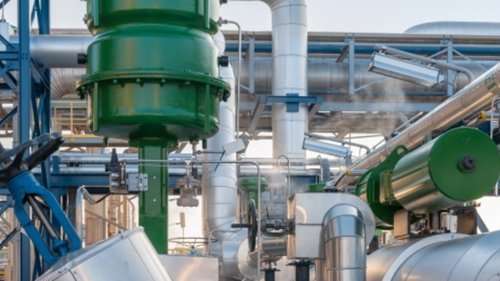
Avantium, a technology development company specializing in renewable chemistry, has begun construction on a new demonstration plant to produce bio-based mono-ethylene glycol (MEG) from renewable sugars. MEG is used in the production of consumer goods such as plastics and textiles, and the demand for it is expected to increase significantly in the coming years. Avantium's plant will use its Mekong technology to convert sugars into bio-based MEG, and the plant is set to be operational in 2019. The company has also been selected by the European Innovation Council for a €146m investment in its technology.
Amsterdam – Avantium N.V., (Euronext Amsterdam and Brussels: AVTX) a leading technology development company and forerunner in renewable chemistry, has started construction of a new demonstration plant that will help advance the production of bio-based mono-ethylene glycol (MEG) made directly from renewable sugars.
As MEG is a component for making everyday consumer goods, such as PET and PEF plastics and polyester textiles, the development of an environmentally friendly plant-based alternative has strong potential. Today, more than 99% of MEG is produced from fossil resources and the market demand for this product is expected to grow from 28 million to 50 million tons in the next 20 years.
“Our novel single-step process can finally fulfil this demand in an environmentally sustainable manner that both consumers and leading brands have been seeking. I am proud of our team for making this important technological breakthrough. This enables renewable products growth for consumers that increasingly demand products brought to them in a responsible manner,” said Tom van Aken, Chief Executive Officer of Avantium.
The new plant will use Avantium’s pioneering Mekong technology to convert renewable sugars into bio-based MEG. The plant – part of a previously disclosed €15-20 million investment in our most advanced technologies – will be operational in 2019, employing up to 20 people.
Alongside this important investment decision by Avantium, the European Innovation Council has selected the Mekong technology as part of its €146 million investment in top-class innovators, entrepreneurs, small companies and scientists with bright ideas and the ambition to scale up internationally. “We are honored to be selected among the 79 innovative projects following face-to-face interviews with a jury of innovators, entrepreneurs and venture capitalists,” said Van Aken.
The objectives of the demonstration plant are to scale up the novel bio-MEG technology, validate the technical and economic feasibility of the process, and to collect data to execute an environmental life-cycle analysis (LCA) quantifying the sustainability benefits of the Avantium technology.
“This is a major step forward in the development of our Mekong technology,” said Zanna McFerson, Chief Business Development Officer of Avantium. “In addition to the environmental benefits, this demonstration plant will replicate commercial scale conditions of producing cost-effective bio-MEG; a drop-in product identical to the fossil-derived product.
We are exploring partnership opportunities in bringing this technology to full-scale commercialization globally.” In parallel to this new development, Avantium is nearing completion of a biorefinery pilot plant for its Zambezi technology that produces high-purity glucose and lignin from non-food
biomass. This biorefinery is located in Delfzijl, the Netherlands.